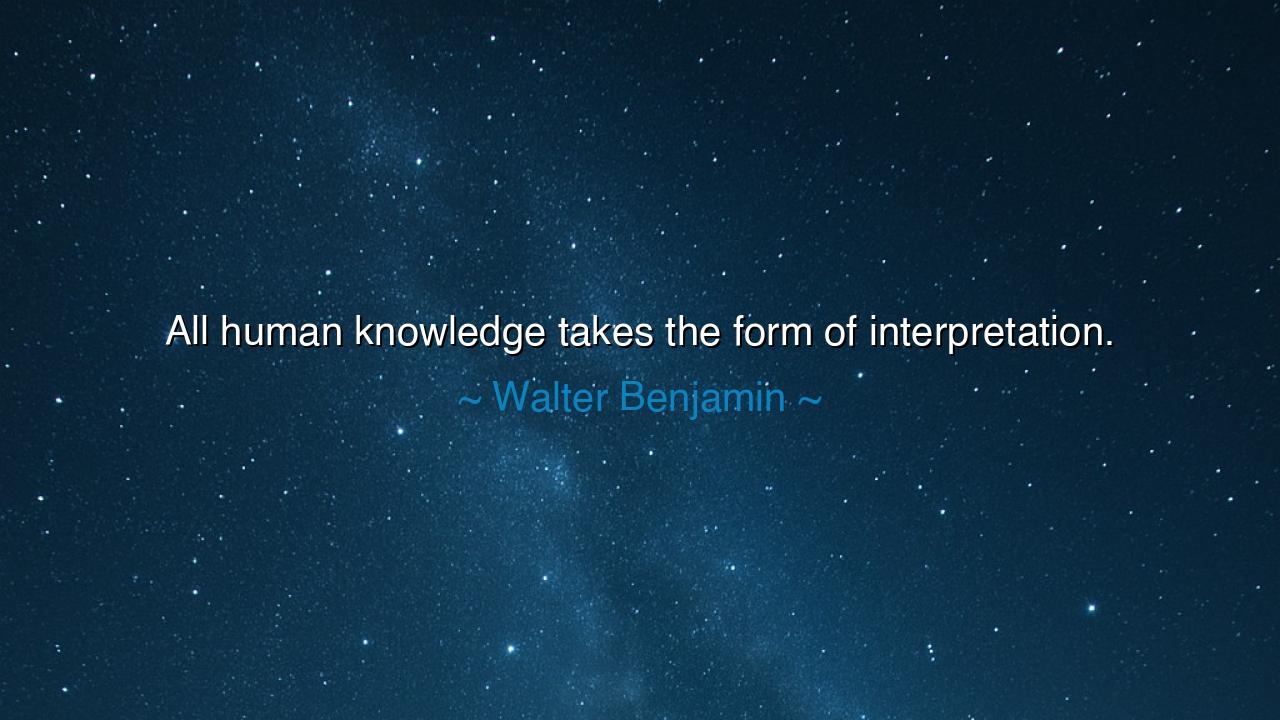
All human knowledge takes the form of interpretation.






Hear the words of Walter Benjamin, the philosopher and keeper of subtle truths, who declared: “All human knowledge takes the form of interpretation.” In this utterance, he uncovers the hidden fabric of our understanding: that no truth comes to us raw or untouched, but always shaped, filtered, and refracted through the lens of perception. What we call knowledge is never a mere mirror of reality, but a human reading of it—a translation of the infinite into the language of the finite mind.
Benjamin lived in an age of upheaval, when wars and ideologies clashed, and when the very meaning of truth seemed uncertain. He saw how even history itself is not a simple record of facts, but an interpretation woven by those who write it, shaped by their values, their hopes, their fears. Thus he warned us: beware of imagining that human knowledge is absolute, final, or untainted. To know is always to interpret, and to interpret is to bring oneself—one’s culture, one’s moment in time—into the act of understanding.
This truth is revealed across the ages. Consider the astronomers of old who looked upon the heavens. The Babylonians interpreted the stars as omens of fate, while the Greeks saw spheres of perfect order, and later scientists found laws of gravitation. All gazed at the same sky, but their knowledge differed, because it was filtered through interpretation. Even the most exact science, Benjamin reminds us, does not escape this, for the theories we craft are interpretations of data, models by which the human mind seeks to order the chaos of the unknown.
History itself offers a powerful example in the story of the Rosetta Stone. For centuries, the hieroglyphs of Egypt were silent to the world, mere symbols without voice. Only when scholars compared them with Greek and Demotic scripts could they be interpreted—and in that act of interpretation, whole realms of knowledge about ancient Egypt opened anew. The symbols were always there, but knowledge came only when meaning was drawn forth by human minds. Thus, even the most ancient wisdom waits to be reborn through interpretation.
Benjamin’s teaching also demands humility. If all knowledge is interpretation, then no single perspective may claim the final word. What seems certain today may tomorrow be reinterpreted in a new light. The past itself shifts as we revisit it, discovering voices once silenced or forgotten. In this, he reminds us that truth is a living conversation, not a monument carved in stone. The wise, therefore, do not cling too tightly to their own certainty, but listen for the interpretations of others, knowing that each carries a fragment of the whole.
The lesson is clear: approach knowledge not as a possession, but as a dialogue. Question what you are told, and ask how it has been shaped by those who speak it. When you study history, ask who wrote it and why. When you hear claims, test the lens through which they have been seen. Interpret with care, for your own understanding will also shape how others see. In this way, you become not merely a receiver of knowledge, but a conscious interpreter, adding your voice to the human chorus.
So I say unto you: live as seekers, not of final answers, but of deeper interpretations. Do not fear uncertainty, for it is the very soil from which wisdom grows. Share your understanding with humility, knowing it is but one thread in a tapestry woven by countless hands. For as Walter Benjamin declared, “All human knowledge takes the form of interpretation.” To remember this is to walk wisely, with eyes open, and with heart prepared to learn anew at every turn.
Thus his words endure, guiding us to see that knowledge is not a fixed treasure, but a river of interpretations flowing through time. Drink from it, add to it, and pass it on, that future generations may also learn to read the world with clarity, humility, and wonder.






AAdministratorAdministrator
Welcome, honored guests. Please leave a comment, we will respond soon